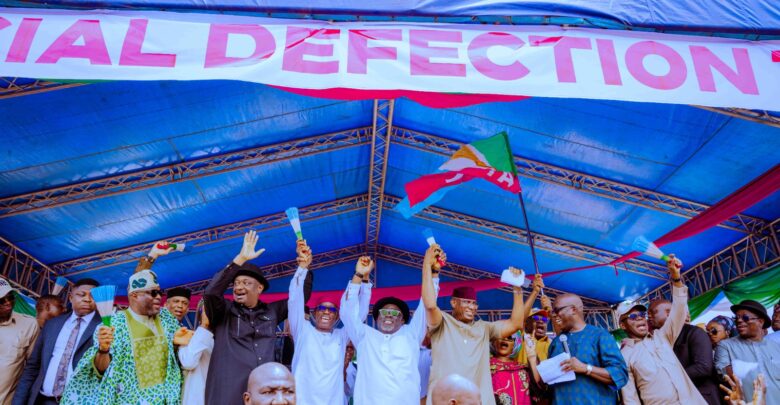News
Oborevwori’s Political Gamble: Delta’s Shift to APC Raises Questions on Unity, Stability

By Francis Sadhere, Warri
In a stunning political twist, Delta State’s Executive Governor, Rt. Hon. Sheriff Oborevwori, has led an unprecedented mass movement of Delta’s People’s Democratic Party (PDP) leaders and members into the All Progressives Congress (APC), declaring full control of the new political landscape. However, behind the spectacle of celebrations at the Cenotaph in Asaba, political watchers are already raising critical questions: Can Oborevwori manage the delicate balance of old loyalties and new alliances?
While thousands cheered the governor’s declaration that “there will be no faction in Delta APC,” experienced political analysts warn that integrating diverse political interests — especially those who once stood on opposing fronts — could become Oborevwori’s toughest battle yet.
The ceremony, described as a “political tsunami” by Vice President Kashim Shettima, has indeed redrawn the South-South political map. Yet, Vice President Shettima’s subtle reminder — urging Oborevwori to “carry along” influential APC leaders like Senator Ovie Omo-Agege — hinted at the underlying tensions that could test the strength of this new alliance.
The Fragile Peace
Delta’s APC has long been characterized by internal factions and leadership tussles, with personalities like Omo-Agege building strong political bases. The sudden influx of an entire PDP structure, with its own loyalties and ambitions, could either strengthen the APC’s position or ignite new internal conflicts if not carefully managed.
Political observers note that while Governor Oborevwori’s declaration of “no factions” was bold, unity cannot be achieved by pronouncement alone. Negotiations, power-sharing, and concessions will likely determine how long this newfound unity lasts.
Okowa’s Risky Bet
Former Governor Ifeanyi Okowa, a major architect of the move, also appears to have wagered his political future on this gamble. Speaking emotionally at the event, Okowa emphasized that the decision was made “in the best interest of Deltans.” However, critics argue that the real test will be whether the move benefits the people or simply reconfigures the political elite.
Analysts suggest that Okowa’s role in orchestrating the shift leaves him politically vulnerable. Should the move backfire, both his legacy and influence could suffer significant blows.
Hope Amid Uncertainty
Despite the risks, APC leaders are optimistic. Imo State Governor and Chairman of the APC Governors’ Forum, Senator Hope Uzodimma, hailed Oborevwori’s governance style, saying, “Delta already looks like an APC state.” Uzodimma’s remarks highlight the belief that with proper leadership, Delta could become a major APC stronghold ahead of 2027.
Still, many insiders caution that sustained success will depend on managing expectations within the party, delivering on campaign promises, and fostering genuine unity across both old and new members.
Only Time Will Tell
For now, Delta State basks in the glow of a historic political realignment. Yet, as the initial excitement fades, real challenges loom. Will Oborevwori’s bold gamble pay off? Or will the centrifugal forces of ambition, old rivalries, and new expectations pull the new APC structure apart?
Only time — and skilled political management — will tell.
In a stunning political twist, Delta State’s Executive Governor, Rt. Hon. Sheriff Oborevwori, has led an unprecedented mass movement of Delta’s People’s Democratic Party (PDP) leaders and members into the All Progressives Congress (APC), declaring full control of the new political landscape. However, behind the spectacle of celebrations at the Cenotaph in Asaba, political watchers are already raising critical questions: Can Oborevwori manage the delicate balance of old loyalties and new alliances?
While thousands cheered the governor’s declaration that “there will be no faction in Delta APC,” experienced political analysts warn that integrating diverse political interests — especially those who once stood on opposing fronts — could become Oborevwori’s toughest battle yet.
The ceremony, described as a “political tsunami” by Vice President Kashim Shettima, has indeed redrawn the South-South political map. Yet, Vice President Shettima’s subtle reminder — urging Oborevwori to “carry along” influential APC leaders like Senator Ovie Omo-Agege — hinted at the underlying tensions that could test the strength of this new alliance.
The Fragile Peace
Delta’s APC has long been characterized by internal factions and leadership tussles, with personalities like Omo-Agege building strong political bases. The sudden influx of an entire PDP structure, with its own loyalties and ambitions, could either strengthen the APC’s position or ignite new internal conflicts if not carefully managed.
Political observers note that while Governor Oborevwori’s declaration of “no factions” was bold, unity cannot be achieved by pronouncement alone. Negotiations, power-sharing, and concessions will likely determine how long this newfound unity lasts.
Okowa’s Risky Bet
Former Governor Ifeanyi Okowa, a major architect of the move, also appears to have wagered his political future on this gamble. Speaking emotionally at the event, Okowa emphasized that the decision was made “in the best interest of Deltans.” However, critics argue that the real test will be whether the move benefits the people or simply reconfigures the political elite.
Analysts suggest that Okowa’s role in orchestrating the shift leaves him politically vulnerable. Should the move backfire, both his legacy and influence could suffer significant blows.
Hope Amid Uncertainty
Despite the risks, APC leaders are optimistic. Imo State Governor and Chairman of the APC Governors’ Forum, Senator Hope Uzodimma, hailed Oborevwori’s governance style, saying, “Delta already looks like an APC state.” Uzodimma’s remarks highlight the belief that with proper leadership, Delta could become a major APC stronghold ahead of 2027.
Still, many insiders caution that sustained success will depend on managing expectations within the party, delivering on campaign promises, and fostering genuine unity across both old and new members.
Only Time Will Tell
For now, Delta State basks in the glow of a historic political realignment. Yet, as the initial excitement fades, real challenges loom. Will Oborevwori’s bold gamble pay off? Or will the centrifugal forces of ambition, old rivalries, and new expectations pull the new APC structure apart?
Only time — and skilled political management — will tell.


